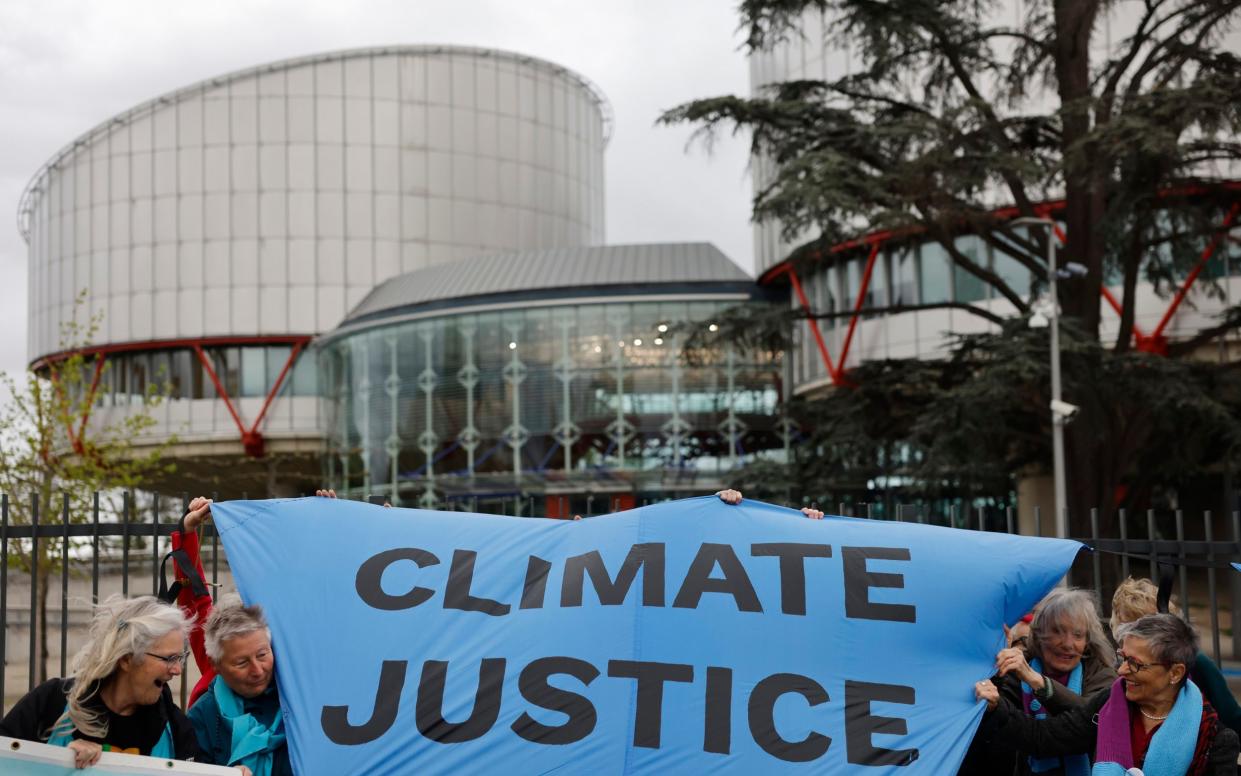Letters: Strasbourg’s climate ruling shows why Britain should leave the ECHR

- Oops!Something went wrong.Please try again later.
SIR – We should welcome the ruling of the European Court of Human Rights, which seeks to force Switzerland to enact the climate policies of Greta Thunberg and her friends (“Tory backlash over European court’s climate ruling”, report, April 10).
For it banishes all doubt: the UK must leave the European Convention on Human Rights (ECHR) as soon as possible.
This victory for the eco-warriors is a dire warning. We voted for Brexit to regain our national sovereignty; we cannot allow ourselves to be governed by lawyers in Strasbourg.
Our departure will also leave us free to tackle illegal immigration effectively, with policies decided by our own democratically elected government.
John Hicks
Manchester
SIR – The legal profession appears to be interfering in politics and blocking government policy quite unjustifiably. Its tentacles are stretching ever more deeply into our lives under the aegis of European court rulings and the nonsense that emanates from other unelected bodies. Lawyers are supplanting Parliament’s authority, not supporting it.
The balance between rights and obligations is now totally out of kilter – something that is highly unlikely to be addressed and reversed by a Labour government. Voters beware.
John Kellie
Pyrford, Surrey
SIR – The European Court of Human Rights might just as well have decreed that we all have the right to walk on water. A country the size of Switzerland, or the UK, could go 100 per cent carbon neutral and it would have no impact on climate change.
There are four major players who can make a difference: the United States, China, India and Russia. Until those countries decide how they are going to banish carbon from their economies, we and the Court are whistling in the wind. This is a clear example of why the Court should have no place in our lives.
Jonathan Arthur
Parkgate, Wirral
SIR – How far down the road of political farce does this travesty of a court have to progress before governments have the guts to do something? It is obvious that its latest judgment is ill-conceived.
The United Kingdom must leave the ECHR immediately. It has outlived its usefulness, and European judges are now seeking to seize the kind of political power that, in a civilised society, must remain in the hands of elected officials.
Charles Penfold
Ulverston, Cumbria
SIR – We don’t need to leave the ECHR. Instead we should do as the French do and simply ignore the rulings that we do not like.
Sandy Pratt
Storrington, West Sussex
Mobile phone ban
SIR – What on earth is the point of bringing in a law to stop under-16s from buying a mobile phone? Whatever happened to people, parents and teenagers making wise choices for themselves?
What the Government needs to do is banish social media platforms – they cause nothing but grief.
Alexandra Turner
Upton Grey, Hampshire
Letters from inside
SIR – Like Dinah Johnson, the founder of the Handwritten Letter Appreciation Society (report, April 9), I believe in the importance of letter writing. My experience is based on 30 years of working with prisoners who have had their means of communication confiscated.
All prisoners can send one letter a week, posted at public expense. For those who are missing regular contact with loved ones, or who are looking to rebuild family ties, this is an important – though underused – provision.
The process of writing a letter gives the sender time to reflect and to communicate something with much more thought than a rushed phone call at an inconvenient time ever can. It is still an important way of maintaining essential contact.
Stuart Harrington
Burnham-on-Sea, Somerset
SIR – As a child I received a letter-writing kit to improve my writing skills. Love letters would often include S W A L K (Sealed With A Loving Kiss) on the back, and a smudge of lipstick or a dab of perfume. Adding an emoji to an email is not nearly as romantic.
Whenever I stay in a hotel I always leave a thank-you note for the housekeeping staff.
Bernard Powell
Southport, Lancashire
Costly postal delays
SIR – I was due to have a CT scan at the local hospital today. A small package of “preparations” was sent first class from the department on April 3 (Letters, April 9), the contents of which were to be taken prior to the appointment.
This package arrived yesterday, so the scan has had to be rescheduled. This means that there is probably a very expensive piece of hospital equipment, and its attendant staff, standing unused due to the parlous performance of our postal system.
Guy Frankham
Norwich
SIR – The NHS has an excellent system called MyChart that enables hospitals to communicate with patients online. It is used by the Royal Brompton and Royal Marsden hospitals, both of which I attend for tests.
This week the Brompton rang to agree a date for an appointment in May. Ten minutes later I received a text and an email telling me to check MyChart. It gave details of my appointment and a covering letter, a paper copy of which I’ll be sent before my appointment. The Royal Brompton also puts up the results of my tests so I can see what was done.
I can also upload my medication and allergies to MyChart so the information can be shared with other hospitals.
Roger Stones
Dorking, Surrey
Too big to park
SIR – If manufacturers insist on making cars that are too wide for parking spaces (“Drivers struggle to get out of wider vehicles”, report, April 9), they should design them with sliding doors.
Rosie Tate
Whitley Bay, Northumberland
Members’ gender
SIR – I am a member of the Garrick Club, which Mary Beard (report, April 9) says she would “love” to join. It is, as she says, a wonderful place to visit, but it’s absolutely hopeless for networking.
So, to further my career prospects and spread my social wings, I have put my name forward to join one of the many private women-only clubs in London. I am less interested in joining the Mothers’ Union or Women’s Institute, but never say never.
Of course, as with the Garrick, I shall have to wait before I am considered for membership, but these female bastions will surely be keen to follow the Garrick’s example if it admits members of the opposite sex.
Jeremy Nicholas
Great Bardfield, Essex
The value of a degree
SIR – Matthew Lynn’s article (“Time to admit we need fewer students”, Comment, April 8) misses some crucial facts.
Despite short-term challenges, our research shows that by 2035 more than 11 million extra graduates will be needed in the UK, and 88 per cent of new jobs are projected to be at graduate level.
Moreover, government research shows that further education has been the only consistent factor in increasing UK productivity over the past 15 years. While we share the concerns Mr Lynn raises about sustainable funding for universities, the solution should not be to retreat to a system in which only the elite get to access higher education.
Going to a UK university remains a great investment. A degree continues to boost salaries significantly, as well as employment levels and career prospects throughout life. It is striking that those who make the argument for restricting places often benefited from a university education themselves and want their own children to go.
Surely young people should be given the same opportunities as the generations before them.
Vivienne Stern
CEO, Universities UK
London WC2
Howard’s end
SIR – My younger brother struggled so much with the pronunciation of my first name that for years I was known as “Ash”.
So imagine my mixed feelings when, in my 20s, a work colleague christened me “Aitch” (Features, April 10) – a sobriquet that has stuck.
Howard Collerson
Stockton, Warwickshire
Sensitivity edits diminish authors’ creations

SIR – What a shocking travesty of our wonderfully rich English language for Puffin to agree to reduce Roald Dahl’s description of the Oompa-Loompas from “tiny”, “titchy” or “no higher than my knee” to just one word, “small”, to avoid causing offence (“Celebrity Dahl spin-off criticised for Mrs Twit’s ‘disgusting’ eye”, report, April 6).
This is while we teachers work so hard to encourage children of all ages to use good descriptive language.
Sally Aspin
Lower Peover, Cheshire
SIR – I have a few glass eyes I can give Mrs Twit.
I always keep a spare in my wash bag as I once lost one down a Paris plughole.
Deborah Dann
Benhall, Suffolk
The Tories are waging war on hard workers
SIR – The doubling of rates on second homes (Letters, April 9) is just another middle-England tax. I followed the Conservative mantra to work hard to get ahead, save money and help the economy through taxation. I was able to buy a second home to holiday in, and to rent out to support my pension, in the village where I spent so many happy summers growing up.
With no discussion, the council will double the rates. I will not get better service. If I sell, someone with more money will buy the house, not a local first-time buyer. The real issue is the lack of opportunity for young people to stay and work in coastal regions, and the lack of planned affordable housing.
In addition, some 50 holiday chalets have been erected next door, which don’t fall into the same bracket of second homes and are thus exempt from the tax. They are second homes in all but name.
David Coverdale
Leeds, West Yorkshire
SIR – Michael Gove, the Communities Secretary, has tried to justify legislation allowing local authorities to charge a council-tax premium on second homes by suggesting that the aim is to persuade owners to sell up and thereby make more homes available for local people. In fact, this policy will no more achieve its stated aim than any other policy designed to tax perceived advantage.
Politicians of all stripes have failed to maintain a grip on public expenditure and, rather than deal with this, now spend their time seeking out new sources of revenue, particularly from those who work hard and make apparently selfish choices about how to spend their own money. Politicians then seem surprised when people decide to stop working hard, or at all, because much of any additional earnings is taxed either directly or via the above misguided policy.
Ian Mackenzie
Preston, Lancashire
Letters to the Editor
We accept letters by email and post. Please include name, address, work and home telephone numbers.
ADDRESS: 111 Buckingham Palace Road, London, SW1W 0DT
EMAIL: dtletters@telegraph.co.uk
FOLLOW: Telegraph Letters on Twitter @LettersDesk
NEWSLETTER: sign up to receive Letters to the Editor here

